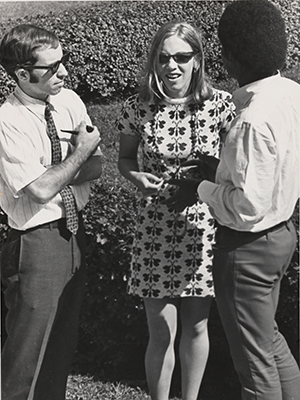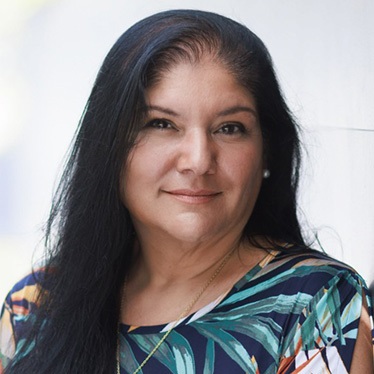Syracuse’s Black History Maker: DC Community Organizer Charles ‘Chuck’ Hicks ’69
February 10, 2023
Syracuse Manuscript
The Maxwell School alumnus became the first Black president of the Student Government Association and helped form the Black Student Union.
The year 1968 was one of tumult and change in the United States, marked by the assassinations of Martin Luther King Jr. and Robert F. Kennedy, social unrest over civil rights and the Vietnam War and the passage of the landmark Civil Rights Act of 1968.

It was also the year that Charles “Chuck” Hicks ’69 B.A. (PSc), G’73 became Syracuse University’s first Black president of the Student Government Association (SGA)—a historic victory for the Bogalusa, Louisiana, native who came north for college to escape retaliation for his family’s civil rights activism.
Hicks’ father, Robert Hicks, was founder of the Deacons for Defense and Justice, the first Black group in the civil rights movement to carry guns for protection, started after the assassination of Malcolm X in 1965. The group was instrumental in organizing a successful boycott of white businesses in Bogalusa as well as the longest march for civil rights, from Bogalusa to Baton Rouge, which took 10 days to walk the 106 miles.
Hicks, the oldest of five children, was a sophomore at Southern University and a student leader when he was asked to withdraw from school or face expulsion, because “the school didn’t want any trouble.”
Hicks and his family were devastated, but soon learned of a summer program at Brandeis University for talented Black students from the south that led to full scholarships at private colleges and universities in northern states. Hicks was accepted, and after the summer program, landed at Syracuse University, where he was required to enroll as a first-year student.
Hicks had grown up in a segregated environment in Bogalusa and never had white friends. But with only 50 or so Black students at Syracuse, he chose not to segregate himself. Outgoing by nature, Hicks immediately got involved on campus, serving on his residence hall board, his class council and started a chapter of the Student Nonviolent Coordinating Committee to partner with Black community groups on various activities.
“Most students were from Northeast states. Being Black and from the South, I was something of a novelty,” says Hicks, who was rushed by numerous white fraternities. “People would sometimes say to me, ‘You’re not like the other Blacks we see or hear about. I had to tell them, ‘Yes, I am. We face the same struggles and problems.’”
As a junior, Hicks became the first Black president of University Union. “After that, everybody started asking me if I was going to run for student body president,” he says.
Hicks beat his opponent in that election, 1,585 to 998, and set out on an agenda that included loosening rules around student behavior. “Even though Syracuse was a liberal school, it was very restrictive from our perspective,” he says. “Students had a curfew. At the time, you could only stand in the dorm lobby to chat with female friends. That rule changed to allow coed visits, which meant you could go to someone’s room, but the door had to stay open. Then SGA advocated for coed dorms.”

Along with his leadership of the general student body, Hicks began working with other Black students to establish the Black Student Union on campus and organize a takeover of the administration building to demand an increase in Black students, Black professors and Black history courses. “The administration turned the electricity off on us, but they never let the city police in to clear us out,” he says.
Despite Hicks’ popularity on campus, he says he was viewed as an “agitator” in the wider community. “If I drove off campus, I would get pulled over and arrested,” he says. “In my last two years, I must have been arrested 25-30 times. I would call Dr. Sawyer and he would call an attorney who would get the charges dismissed.”
Michael Sawyer was a Maxwell School professor who in 1972 also became the University’s interim vice chancellor for student programs.
Over time, things began to escalate. After graduating with a degree in political science, Hicks began graduate school in education administration and was living in an off-campus apartment with friends. “One day police rushed into the house and said they found marijuana that was mine,” says Hicks, who was jailed. David Ifshin ’70, who succeeded Hicks as SGA president, organized a protest, and 200 students marched on the jail demanding Hicks’ release. “That made me even more of a marked person. Dr. Sawyer suggested that Syracuse might not be the best place for me to stay to get my doctorate,” he says.
An arrangement was made for Hicks to double up on summer courses and take an oral history exam so that he could earn a master’s degree and leave. He subsequently earned a second master’s in library science from the University of Maryland and moved to Washington, D.C., where he had a 35-year career with the DC Public Library, primarily in the Black History Section of the Martin Luther King Jr. Memorial Library.
Always a leader, Hicks served as president of the trade union for the DC Public Library, the American Federation of State, County and Municipal Employees (AFSCME), and later as president of AFSCME District Council 20, the largest public sector union in the District of Columbia.

A well-known community organizer, Hicks is the founder and director of the D.C. Black History Celebration Committee, which celebrates Black history year-round, and was grand marshal of the 2021 Virtual D.C. MLK Parade. A speaker at the inaugural Million Man March, he is the founder of Bread for the Soul, the first and oldest Black AIDS organization in the city, and an active member of numerous organizations, including the NAACP, the Southern Poverty Law Center, the Martin Luther King Scholarship Committee, the D.C. Commission on Aging, the Waterside Tenants’ Council and Stand Up for Democracy in D.C. In 2019, he was elected to the Washington D.C. Hall of Fame and his name appears on the Hall of Fame Walkway. In 2021, he was selected to be in a permanent exhibit at the Martin Luther King Jr. Memorial Library as a D.C. History Maker.
Hicks recalls his Syracuse University experience as an incredible journey, but not a totally happy time.
“My experience as student government president was both the best and worst of times,” he says. “There were a number of white students that were not pleased with me being the SGA president. “There were a number of more progressive African American students that felt I should focus solely on efforts to benefit Black students. And there were people who didn’t think that SGA should have been involved protesting the war in Vietnam. There were always adverse views on what I should focus on, but I addressed the pushback by saying that I was elected to be the student body president for everyone on campus.”
By Renée Gearhart Levy
Reprinted with permission from the Winter 2022 Syracuse Manuscript magazine
Published in the Spring 2023 issue of the Maxwell Perspective
Related News
School News

Dec 20, 2024
School News

Dec 20, 2024
School News

Dec 9, 2024
